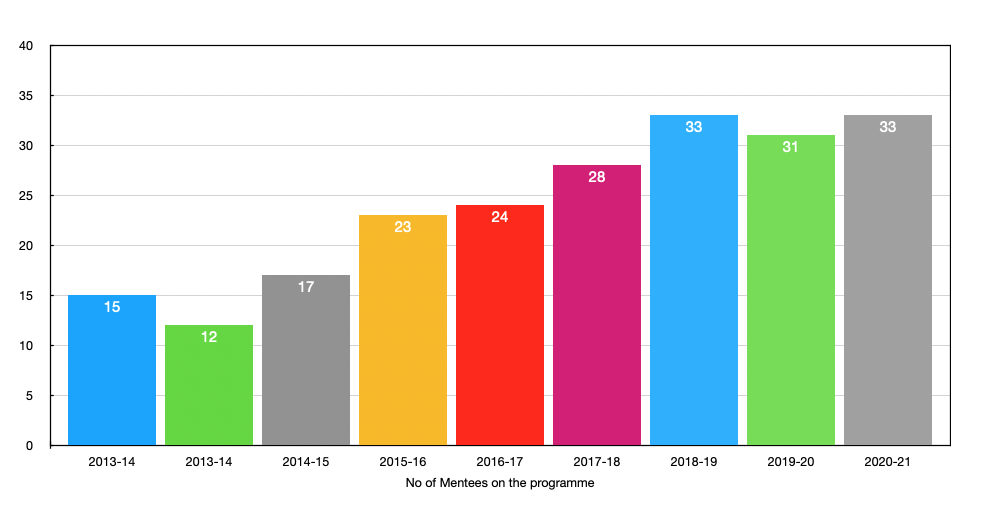
This service is the first of its kind in the UK.
If you are an experienced counsellor or psychotherapist of Black, African, Asian or Caribbean heritage we need your knowledge and expertise.
FAQs
Videos of frequently ask questions
Donate
Contribute to the running the programme
Applications are now closed and will reopen in the new year if there is capacity.
Programme Overview
This service is the first of its kind in the UK. The aim is simply to provide help and support to students of Black, African, Asian and Caribbean heritage who are in counselling or psychotherapy training by way of a free mentoring service. The programme is set up to run within the academic year. If you are an experienced counsellor or psychotherapist of Black, African, Asian or Caribbean heritage we need your knowledge and expertise to ensure this mentoring programme is a continued success. We’re looking for therapists who have successfully navigated their way through the challenging and demanding training process and survived to tell the tale. As part of your role as mentor, you will be responsible for helping the mentee navigate their way through a similar process, ‘Each One Teach One’. Download Flyer
2023 – 2024 PROGRAMME DETAILS
The Basics
- To take part in the mentoring programme, participants need to have a BAATN membership. Sign up for Membership
- The programme will run for 7 months within the academic year, from January 2024 to the end of July 2024.
- This programme has been set up and is run by volunteers and survives through membership fees, donations and crowdfunding.
Timeline
- Applications to the mentoring programme run from Monday, 25 September to Friday, 01 December 2023.
- Between Monday, 16 October and Monday, 04 December 2023, prospective mentors and mentees will be invited to attend an online information session via Zoom to learn more about the programme and to ask questions. These will be followed by an online one-to-one induction meeting for each new participant.
- The first application window to the EOTO mentoring programme will close on Friday, 01 December 2023.
- Up until Friday, 08 December 2023, those who have made applications will be allocated potential matches based on their application preferences.
- If there is the capacity for further mentees, another window for applications will be open between Monday, 08 January and Friday, 26 January 2024.
- Unfortunately, we cannot accept applications outside of these two application windows.
- You can find other support for students here.
Quick Timeline
– 1st application window and inductions – Monday 25 September to Monday 04 December 2023
– Online information sessions run from Monday, 16 October 2023 to Monday, 04 December 2023
– Initial matches are given to programme participants – by Friday, 08 December 2023
– Programme starts – the first week of January 2024
– 2nd application window and inductions – Monday 08 January to Friday 26 January 2024
– End of programme – end of July 2024
Matching The mentoring programme will pair mentees with an experienced therapist who has successfully navigated their way through the challenging and demanding training process and survived to tell the tale. On your application, you can express your preference for matching, for example, gender, ethnicity and theoretical orientation, etc. Online mentoring is available, however, we can also look to match you with a mentor who is near your geographical area. On your application, you can also tell us other areas that are important to you so that we can look to offer you the best possible match. Once we have your details, we will access our database of mentors and match the closest mentor to your profile. While we make every effort to match as closely as possible, we ask that you be understanding and flexible in this regard.
The importance of the prgramme
Inequality of access for black, Asian and minority ethnic [BAME] communities is a well-recognised reality for many psychological therapy services, and the insensitivity of UK mental health services to ethnic diversity is an enduring problem.
Having more therapists from BAME communities in the therapy profession could go some way to address this inequality; however, there is a low percentage of BAME therapists in the profession compared to the general BAME population. One reason is that while BAME individuals are starting psychotherapy and counselling training courses, they frequently drop out.
Living in a racialised world significantly impacts the identity of BAME people, and often trainings are just not flexible enough to meet BME people where they are emotionally or theoretically. This can lead to frustration, disillusionment and then disengagement.
We are addressing this drop out rate through a mentoring program called Each One Teach One. This programme will support and nurture Black, African, Asian and Caribbean trainees to stay in their training and make their contribution to the therapy profession and the mental health of the UK.
At BAATN, we understand the challenges presented to Black, African and Asian people who are training to become therapists and appreciate how frustrating it can sometimes be when it seems there is little or no support for issues that are important to you. Issues arising from a training course, for example, can be highly emotive to one’s ethical, spiritual or personal belief and value system and as Black, African and Asian people, we understand that these issues can be easily overlooked. This can happen for a number of reasons:
- Fear of the unknown for tutors
- Tutors unsure of how to process the information displayed or disclosed
- Possible collusion (if tutor is also Black or Asian)
- Preconceived stereotypes regarding Black, African and Asian people generally.
- Preconceived stereotypes regarding Black, African and Asian people in education
WHAT IS MENTORING?
Mentoring can be an enriching relationship for both parties, where one more experienced person (Mentor) shares their knowledge, skills, information, insights and life experience with another less experienced person (Mentee), in order to create growth through personal and professional development, problem-solving and discussion of issues to reach the specific goals of the Mentee using constructive feedback. However, the success of this relationship depends on the communication, commitment and participation of both the Mentor and the Mentee in a confidential space.
The Mentor’s Role
The roles of a Mentor can vary depending on the needs of the Mentee. The roles that successful Mentors use are as follows:
Teacher/Advisor Role – to share knowledge, the wisdom behind mistakes and explain in detail what is expected from the Mentee. This role requires the Mentor to develop realistic career goals with the Mentee and make an action plan of areas to develop.
Problem Solver Role – referring the Mentee to resources, answering questions in an open, respectful way and offering other options and opportunities where available. By creating new opportunities with a minimum of risks the Mentee should not be able to fail, so not affecting their self-esteem in a detrimental way. Be guided by your Mentee to know when these opportunities will be helpful, or a hindrance.
Motivator Role – giving encouragement, positive feedback and support to the Mentee during challenging times and during specific tasks to generate inner drive and act as a morale booster to the Mentee’s self-esteem. Being reliable and consistent is vital to Mentees, so Mentors should be clear from the start about their availability to the Mentee, to ensure clear boundaries and to reduce misunderstandings. A Mentee who has this open door policy is more likely to ask questions, seek guidance and feel supported.
Coach Role – By giving clear, positive and constructive feedback to the Mentee enabling them to work to overcome difficulties and change behaviour if necessary. In order to do this effectively you need to ask three specific questions;
1. Does the Mentee have the capacity to do the task/job?
2. Is coaching likely to upgrade the Mentee’s skills?
3. Is there sufficient time to coach? If you know how to provide feedback, then the role of the coach is much easier to perform.
However, four factors need to be considered before giving feedback. They are:
1. Make sure that the feedback is frequent and useful to the Mentee to give a clear understanding of the progress made so far.
2. Give quality feedback.
3. Make the feedback specific- how, when and why.
4. Give direct feedback on what you have observed.
To give constructive feedback to ensure that;
1. You describe the behaviour that you have observed
2. Do not use labels
3. Do not exaggerate
4. Do not be judgemental
5. Phrase the issue as a statement, not a question
Guide Role – Set 5 realistic goals;
1. Be specific as to what the Mentee wishes to achieve, but remain flexible in case of change.
2. Make goals that can be time- framed and limited in number.
3. Ensure that meetings are results orientated, concentrating on the results obtained not the activity it takes to get there.
4. Make the goals realistic and relevant.
5. Make the goals achievable.
Other Mentor Qualities Successful Mentors have the following characteristics;
Supportive – supporting the needs of the Mentee through adversity and challenge.
Ability to be Patient – commitment of the Mentor to spend time with the Mentee performing mentoring responsibilities.
Respected– Giving the Mentee a positive role model by showing real-life examples of values and ethics in professional practice. Learning by example is the most effective tool a Mentor has, allowing the Mentee to observe how the Mentor handles situations and interact with others. For this reason, it is vital that all Mentors strive for high professional standards of professionalism, solid work ethics and a positive attitude.
The Mentee’s Role?
Mentees can be anyone who wants to achieve their goals beyond their current position, using the opportunities provided by the Mentor. Mentees are bright and motivated individuals who can vary in age, gender and work or training experience.
Mentees are:
Learners who wish to learn new skills, insights and abilities.
Decision Makers who take charge of their own education.
Initiators who are willing to explore and challenge new initiatives.
Risk Takers in exposing themselves to a Mentor to challenge adversity and learn new ways of knowing and understanding.
Goal Setters who set their own goals and take steps to succeed.
In order to make the Mentee and Mentor relationship successful, look for clues to how the Mentee is feeling;
– Give appropriate eye contact in a respectful way.
– Make the Mentee feel comfortable to ensure trust is built.
– Use hand or facial gestures to show enthusiasm and smile often to show reassurance.
– Use open body language leaning forward to show interest.
– Be power aware in spaces so ensuring that desks and chairs are not acting as barriers between you.
– Ensure personal space is maintained between the Mentor and Mentee.
– Allow time for the Mentee to process information and solve their own problems before seeking help.
– Make the relationship fun!
Programme Coordinator
Mentoring Programme Support
Programme Lead
Programme Feedback
In the 2020-21 programme, 29 mentors supported 33 counsellors, psychotherapists and counselling psychologists to navigate their way through the issues that came up for them in their training courses. The feedback and comments were overall very positive with both mentees and mentors expressing appreciation for being part of the programme. Below are the survey results from the mentors and the mentee in more detail.
Mentor Survey Results from the academic year 2020-21
Mentee Survey Results from the academic year 2020-21
Number of mentees per year
Mentee Comments from previous years
“Dear Eugene,
I got in touch with you around the end of 2016 when I was in the process of looking for a placement. You encouraged me to write on the BAATN site expressing what my needs were. One of your members contacted me. He has been supportive from placement, into transition, and now into setting up private practice, offering advice and cautions at each sharp turn.
It is no exaggeration to say that both training, and transitional work have tested my resolve, my awareness and compassion in ways that I could not have anticipated, and consequently, I have grown beyond anything I could have envisioned.
Its unfortunate that due to my personal circumstances, I was unable to participate as a student member, but as of today, I am a fully paid up practitioner member. As a beginner therapist, with a beginners mindset, I want to say thank you for those first steps. I hope to see you in the flesh at one of the BAATN meetings at some point
Warm wishes,”
Gina Silva
“Good Morning Eugene & Sheila,
Before I contacted BAATN I was a bit lost, and blocked and had a number of incomplete components for my course with time running out. My final project proposal had been rejected twice and it felt like a major obstacle I had little strength to tackle again.
The work that I have done with [my mentor] has helped me deeply, I knew I could work with him after the first day I made contact with him he called me at 9pm that evening and we chatted for about an hour.
I’ve found [my mentor] to be very gifted spiritually, caring, attentive, insightful, encouraging and honest about what he himself may struggle with.I could not have been matched up with a better fit and it has helped me tremendously.
After about 2-3 months of our work together, [my mentor] gave me some useful tips to help me process more of my early younger trauma, suggesting I start to journal. I resisted and ‘avoided’ for a while but realised that having [my mentor] there meant I was now supported by someone who understands my uniqueness and is not threatened by it.
I realised that throughout the 5 years of my time studying, I had NEVER read anything around attachment theory – a blind spot I never even thought about. So I started to read about it and it quickly became clear that the things I struggle with personally are due to my own attachment issues.
I was then able to use this learning to create a new premise for my project proposal and designed a whole new project with [my mentor’s] assistance.
I managed to hand in my proposal last week and have already had it marked and the feedback is so positive and encouraging. The marker even states that ‘She was touched by the amount of work I have done on myself to inform my project proposal’. Well I can’t afford to be in therapy right now, so that work on myself is credit to [my mentor] and I am so grateful.
Thank you to you both, I’m so pleased and glad I found the network and this scheme because I just could not have met the challenge alone, and this is why I now see the benefit in coming together and not being in isolation.
I’m now so motivated, I have just finished the additional work for the marker and have typed 4 pages ready to hand in later this evening in a day.
I hope the mentoring scheme is proving as fruitful for others as it has been for me.”
Kind Regards
Darren Peters”
“My mentor has provided me with advice, guidance and the utmost consideration with whatever I bring to our meetings… I feel that BAATN has provided me with the wherewithal to commit to and maintain my presence and way of being on my course. It’s been more than an experience! Many thanks for creating a well run, professional and all encompassing service for people like myself, who greatly needed support that perfectly matched our needs.”
Mentee
“I was having a crisis of confidence with my written work and a challenging experience with peers. My mentor supported me by demonstrating compassion and understanding, which helped me regain confidence and overcome the slump.”
Mentee
“I was placed with someone who was from my own specific culture and religion and I found this very helpful as they provided an empathetic ear to some of my own struggles.”
Mentee
Join the programme as a mentor or mentee
Expectations and commitments
Applications are now closed and will reopen in the new year if there is capacity.
Application Forms
The Links to apply to the programme will be shown below during the 1st and 2nd application windows.

